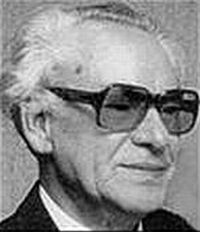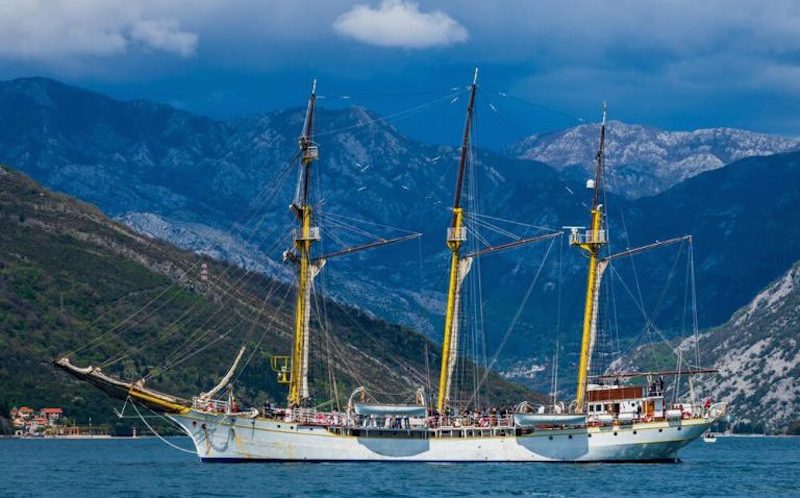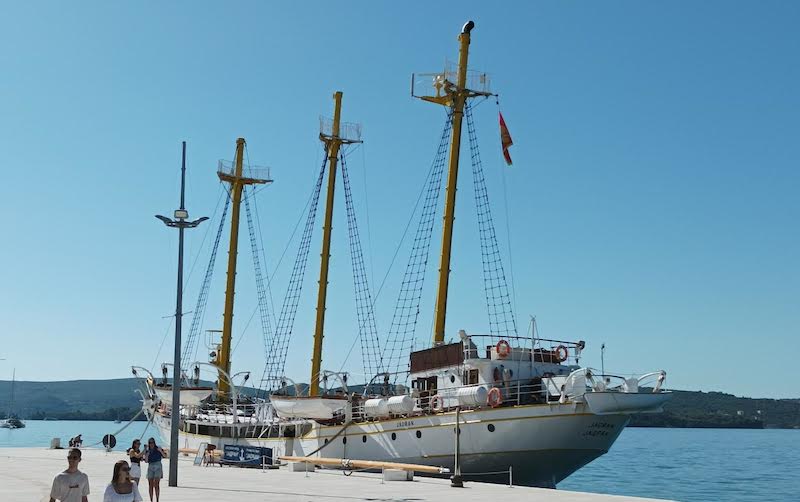|
Croatian culture in Boka kotorska, part III
Vjenceslav Čižek (Gjenovići, Boka kotorska, 1928-2000) died in Dortmund, Germany. He was born in a peasant-working class family, educated in Kumbor and Herceg-Novi, and studied philosophy in Sarajevo. For his political beliefs he was sentenced twice to a total of 17 years imprisonment, and due to savage prison tortures he became blind. After his release he lived in Germany. 
Vjenceslav Čižek
He became internationally known as the "captive of conscience." Vjenceslav Čižek was an exceptional lyricist and satirist of dictatorship. Unfortunately, his literary activity was interrupted by prison. Due to his blindness, he memorised poems while he was in prison using a special mnemonic technique. In his poems he writes about places of his youth - Boka and Konavle. While in prison in ex Yu (in the town of Tuzla), the collection of his texts entitled Vjenceslav Čižek - borac i mučenik was published, subsequently translated into German, English, French, and even into Russian (Kontinent, 1982, p. 34; edited by Aleksandar Solženjicin). Source Hrvatski biografski leksikon (Croatian Biographical Lexicon)
SIN I MATI
Domovino moja trnova krunidbo,
sveto slovo glagoljskog Misala,
oku mome Ti bi svjetlost dala
da i Tvoju zlotvor nije tmicom izbo. EPITAF (na grobu u Sinju)
Bijah samo jedno zrno
U Božjoj žitnici,
Tek jedan kamičak
U Katedrali hrvatske slobode.
Lit.
In 1998 a new mosaic was exhibited in a Catholic chapel in the town of Budva in Boka kotorska, on the initiative of the Pravoslav Church in the city. This was done without knowledge of the Catholic Church. On the other hand, it is known that theVotive Icon of Our Lady existed in the same place from 1333 to 1949, when local yugoslav communists threw it out into the sea. Fortunately, the old Catholic icon was saved (though damaged), but it was not allowed to be placed where it had been for centuries.
It is little known that until 1949 Bosnia - Herzegovina had another entrance to the Adriatic sea in the region of Sutorine (between Prevlaka peninsula and Herceg Novi), which is today in Montenegro. Today quite unjustly the New Yugoslav state claims the right to Croatian Prevlaka. See [Macan]. As confirmed by all partisan documents related to Boka kotorska and Montenegro during WW2, both regions are mentioned with clear distinction: Boka kotorska (which is defined as a coastal region from Herceg Novi to very near the town of Bar) and Montenegro. Since 1945 the name of Boka kotorska was simply erased. The name of Montenegrins (or Yugoslavs) was imposed on the Croats. Even today many Croats in Boka kotorska are hidden under the name of Yugoslavs (of Catholic faith). Andrija Maurović (1901-1981), distinguished Croatian cartoonist and painter, was born in the coastal village of Muo near the city of Kotor. An outstanding Croatian intellectual born in 1919 in Boka kotorska was Luka Brajnovic, professor of Ethics of the University of Navarra, a former director of the Institute of Artes Liberales, a well known Spanish intellectual. Premio Brajnovic a la communication is a prestigious Spanish award (500,000 pesetas) established in his honor during his lifetime upon the initiative of newspapermen and lecturers from the University of Pamplona. Sveto DekovicĂ is a distinguished Croatian sportsman (karate, judo, jiu jitsu) of international reputation (European Kyokushin karate champion 2001), living in Tivat in Boka kotorska, Montenegro. Anton Lukovic (1815-1880), born in Prčanj, was among the principal engineers who participated in building the Suez Canal (193.3 km), completed in 1869. He worked there as an Austrian architect and civil engineer. He was proprietor of a monumental palace Dario in Canal Grande in Venice, where he died in 1880. The palace appears on the work of art by Claude Monet, distinguished French painter, which is kept in the Museum of Art in Chicago. He also had a merchant house in Cardiff. An important fortress at the entrance of the port in Alexandria was built according to his project. During this work, he discovered three old-Egyptian columns from 16-14 century BC carved with hieroglyphics, which were subsequently solemnly donated to Austrian Emperor Franz Joseph I on the occasion of the official opening of the Suez Canal. The columns are now kept in Vienna, in the Egyptian Hall of the Museum of Fine Arts. For his merits, Lukovic earned hereditary nobility from the Austrian Emperor, and the title of Lukovic de Ascrivio. For more details see an article by Siniša Luković appearing in [Vidmarović, Hrvati Boke kotorske kroz povijest, pp. 375-379].
For the reader who thinks that these claims are not sufficiently well grounded, I can offer a personal experience from the city of Zagreb, Croatia's capital. In 1971 a census of population was held in the whole ex-Yugoslavia. At that time I was a 15 years old secondary school pupil. My math teacher "suggested" to everybody, in front of the whole class, to fill in the form as follows: "If I were in your place, I would fill in Yugoslav in the nationality section, and underline it three times." She was a daughter of a Serbian colonel in Zagreb. It was only many years later that I realized the meaning of this "suggestion." 
Jadran (i.e., Adria), Croatian school ship, conceived in Split in 1926, the project was made by Josip Škarica from Rijeka.
The ship was built in Hamburg, Germany, in 1933, length 64 m, 737 tons.

- Trpimir Macan: Rt Oštra u povijesti i politici, Matica hrvatska, Zagreb 1998, ISBN 953-150-168-8
- Miloš Milošević: Iz prošlosti Boke kotorske, Matica hrvatska, Zagreb 2008.
- Stijepo Obad, Serđo Dokoza, Suzana Martinovic: Južne granice Dalmacije od 15. stoljeća do danas, Državni arhiv u Zadru, Zadar 2013., ISBN 978-953-7434-11-3
- Dominik Mandić: Crvena Hrvatska, ZIRAL (Zajednica Izdanja Ranjeni Labud), Chicago-Rim, 1973 (see other Mandic's references related to history of Bosnia and Herzegovina)
- Pavao Butorac: Boka kotorska u 17. i 18. stoljeću - politički pregled (2000.),Kotor za samovlade (1355.-1420.) (1999.), Kulturna povijest grada Perasta (1999.) i Razvoj i ustroj peraške općine (1998.).
- Pavao Butorac: Pisma ruskog admirala Matije Zmajevića / Četiri pisma nadbiskupa Vicka Zmajevića, Zagreb 1948.
- The history of Boka kotorska from Antiquity until 1918, Based on the text "Boka kotorska od najstarijih vremena do 1918" by Ankica and Josip Pečarić. Summarized and translated by Ivica Krešić, University of Chicago.
- Josip Pečarić
- Agneza Szabo: Hrvati Boke kotorske u doba preporoda i bana Jelačića
- Lovorka Čoralić:
- Barani u Mlecima: povijest jedne hrvatske iseljeničke zajednice, Dom i svijet d.o.o., Zagreb 2006, ISBN 953-238-015-9
- Iz prošlosti Boke - odabrane teme, Meridijani, ISBN 978-953-239-070-4
- Boka kotorska - jedno od izvorišta hrvatske pasionske baštine, Tivat, 3.-7. svibnja 2006., V. Medjunarodni simpozij, Udruga Pasionska bastina, ISSN 1334-8264
- Nada Fisković: Slikarsko djelo B. Ivankovica, Hrvatska bratovština "Bokeljska mornarica 809"-Zagreb, 2006.
- Cvito Fisković: Spomenička baština Boke kotorske, Matica hrvatska, Zagreb 2004.
- Zeljko Brguljan: Portreti bokeljskih jedrenjaka, Hrvatska bratovština "Bokeljska mornarica 809"-Zagreb, 2006.
- Dario Musić: Glasilo Hrvata Crne Gore, Hrvatska revija, 2, Zagreb 2007, 33-35
- Antun Tomić:
- Anita Mažibradić: Prčanj - biser u riznici Boke, Hrvatska revija, 2, Zagreb 2007, 38-43
- Anita Mažibradić: Tivat kroz vjekove, Hrvatska revija, 2, Zagreb 2007, 44-48
- Miloš Milošević, Tripo Schubert: Tri hrvatska glazbenika i skladatelja, Hrvatska revija, 2, Zagreb 2007, 49-58
- Hrvatska bokeljska glazba 1910. u Kotoru, Hrvatska revija, 2, Zagreb 2007,
- Vladimir Maruvčić: Hrvati u Baru - "Ostaci ostataka", Hrvatska revija, 2, Zagreb 2007, 59-66
- Stijepo Obad: Hrvatska društva u Boki kotorskoj do Drugoga svjetskog rata, in Stolačko kulturno proljeće, Godišnjak za povijest i kulturu, godište VII, 2009., str. 23-36
- Ivan Bongo Bolica: Opis zaljeva i grada Kotora, Matica hrvatska Dubrovnik, Dubrovnik 2010.
- Milenko Pasinović: Hrvati u Crnoj Gori s posebnim osvrtom na Boku kotorsku i drugu polovicu XX. st., Adamić, Kotor - Rijeka, 2005.
- Kotorska biskupija
- Boka kotorska, Wikipedia
- Dalmatia
- Hrvatsko građansko društvo Crne Gore
- Hrvatski glasnik, Kotor, časpis (mjesečnik)
- Đuro Vidmarović: Hrvati Boke kotorske kroz povijest; Sjećanja i zaboravi; Dux Croatorum, Tivat 2011.
- Đuro Vidmarović: Prilog povijesti Hrvata Gornje i Donje Lastve, Dux Croatorum, Donja Lastva 2013.
- Gracijela Čurić (ur.): Sidrišta zavičaja, Zbornik radova, Kotor, I 2009., II 2010.
- Vinicije Lupis: Povijest i sakralna baština crkve Male Gospe u Gornjoj Lastvi.
- Radio Dux
- Hrvatska glagoljica u Boki kotorskoj, Radio Dux
- Hrvatska glagoljica u Boki kotorskoj
- Hrvatski glagoljički dokumenti iz Gornje Lastve
- Gornja Lastva
- Vesna Čučić: Bokelji između Boke i Trsta [PDF], Naše more, Vol 53, No 1-2, 2006, pp. 77-88.
- Vinicije Lupis:
- Hrvati u putopisu P. A. Tolstoja, 1698. (Dubrovačka Republika i Boka kotorska)
- Gornja Lastva
- Mario Grčević: Ime "Hrvat" u etnogenezi južnih Slavena, Zagreb - Dubrovnik 2019. (for Boka kotorska, see pp. 18-20, 55-57, 67, 68, 80, 117, 219-221, 223; Crna Gora: 15-19, 22, 27, 33, 35, 36, 57, 62, 65-69, 75, 77, 93, 95, 99, 136, 154-158, 160, 161)
- Mario Grčević: Petar Andrejevič Tolstoj i Hrvati od Pelješca do Perasta, Dubrovnik broj 2-3, 2017., str. 12-20
|